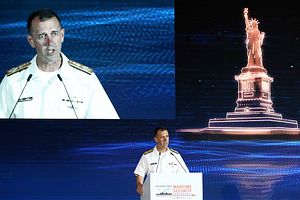A top U.S. admiral said Wednesday the Navy has not stepped up maritime patrols to challenge China’s sweeping territorial claims in the South China Sea but is maintaining a “consistent” presence in the disputed waters.
Chief of Naval Operations Admiral John Richardson, addressing an international security conference in Singapore, sought to reassure regional partners, some of whom have opposing claims in the waters but benefit from good relations with China on other fronts.
“I’ve done the analysis so that I can state with confidence that our level of operations, our presence there, has been consistent over the decades,” Richardson said. “There’s nothing that has spiked recently.”
The International Maritime Security Conference was attended by representatives from 33 navies, including 16 navy chiefs. A Chinese delegate was also present.
The U.S. Navy maneuvers in the South China Sea, so-called freedom of navigation operations, “are by design non-provocative, non-escalatory. They’re just challenging excessive maritime claims in a very consistent basis,” Richardson told the conference.
China has built military installations on seven man-made islands in the crucial waterways it claims on historical grounds. The other claimants, most notably the Philippines and Vietnam, have protested China’s behavior but they also maintain good relations with Beijing.
Richardson said “routine” freedom of navigation operations will proceed with transparency, consistency, and predictability.
They usually involve a U.S. vessel sailing within an island’s coastal waters without prior notification and draw sharp rebukes from China, which claims the South China Sea virtually in its entirety.
“This is not a zero-sum game. There is tremendous prosperity to be gained out there for all, and so we’ll strive to do so in a way that everyone can grow,” Richardson said.
Meanwhile, U.S. and Philippine coast guard ships conducted a joint exercise in the South China Sea.
Captain John Driscoll, commanding officer of the U.S. Coast Guard Cutter Bertholf, told reporters during a port call in Manila that two Chinese coast guard ships were spotted in the vicinity of the exercise.
China is building naval vessels at a rate outpacing its rivals, including the United States, and its missile destroyers and nuclear attack submarines are equipped with increasingly lethal weaponry. Its first domestically built aircraft carrier is set to enter service, with more believed to be in the works.
Richardson said China appears to be “early” in the process of constructing and operating aircraft carriers, but the United States is watching it “very closely.”
“I just have a great deal of respect for how fast things can happen when it comes to China,” he said.
He also pushed for strengthening partnerships with regional navies through exercises, information sharing, and cooperative agreements.
By Annabelle Liang for The Associated Press.

































